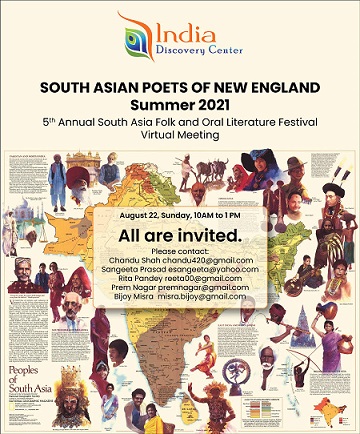Contribute
|
Travel Through India Through Poetry And Voice: 5th South Asia Folk And Oral Literature Festival |
Kushagra Aniket
09/23/2021
Folk
literature has been the vehicle of the sensibilities, imaginations, and
aspirations of societies since the development of human language. The 5th
South Asian Folk and Oral Literature Festival, organized by the South Asian
Poets of New England, was held on Sunday, August 22. The objective of the
session was to attempt to showcase the vast gamut of South Asian Folk Poetry,
rich in its contents, rhythm, and expression, to an assembly of international
poets and enthusiasts of oral literature. Nineteen
poets from Arunachal Pradesh to Gujarat and Kashmir to Tamil Nadu participated
in the literary session celebrating the natural beauty, seasons, festivals,
romance, wisdom, and everyday life of India. Each poet displayed a map
indicating the region of their selected song, a picture representing the area,
and a description or explanation of the song. The
session was opened by SAPNE Convener Bijoy Misra, who welcomed the gathering of
poets representing the diversity of the region. The first presenter Rahul Ray
started the session with a Baul song “What is Lalon’s faith†by Lalon
Shah from Bengal. Bauls are mystic singers who are strong believers in the
universality of the spiritual experience and social harmony. Sangeeta
Prasad followed with a Phagwa, a song sung on the festival of Holi, from
Chhapra in western Bihar. Representing the Awadh belt of Uttar Pradesh, Maneesh
Srivastava recited a self-composed Kajari set to Raga Yaman. The song
described the longing of a wife for her husband during the monsoon season. Chanchala
Priyadarshini from Varanasi presented a Sohar, a genre of songs to
welcome the newborn. The song described scenes from the auspicious night of the
birth of Krishna. Rita Pandey followed with a Kajari song that
celebrated the advent of the rainy season, marked by the singing of the Koyal
bird and the thundering of the clouds. Representing the region of Vrindavan,
Amit Khare sang a Krishna song composed by the poet-bhakta Mirabai. The
song was a call to Krishna to wake up at dawn. Hailing
from Kashmir, Sunayana Kachroo followed with a love song titled “Sonn Vachâ€
or “When Sparrows Sing.†Neena Wahi sang a Tappa, a traditional love
song from the mountains of western Punjab. Amandeep Singh expanded on the genre
of Tappa, which were originally sung by the camel drivers of the region. The
song that he presented was influenced by Sufi philosophy. Preetpal Singh also represented
Punjab by presenting a nostalgic song “Pind†in which the singer reminisces
about his childhood days in the village. Prem
Nagar took the audience on a tour of the rich tradition of folk ballads from
Rajasthan. These folk ballads cover diverse themes ranging from Bhakti to the
valorous deeds of Rajput kings. He sang a devotional song addressed to Ramdeva,
a folk hero who became deified due to his magnanimity and generosity. Mahendra
Bakshi recited a Duho song traditionally composed the by Charans of
Rajasthan and Gujarat. The composition by Dulla Bhaya Kag of Saurashtra
exemplified folk wisdom on generosity towards a guest. Subsequently, Chandu
Shah sang a Gujarati folk song that narrated the beauty of a small town called
Morbi and its people. The song described a local king singing the praises of a
woman on her way to fetch water from a lake. Kushagra
Aniket followed by reciting his self-composed poem (NarmadÄsragviṇī) in
Sanskrit on sacred geography of the River Narmada in Central India. The composition
was an attempt to present Sanskrit as a folk language (Loka BhÄá¹£Ä) and enrich
the classical tradition of nature poetry in Sanskrit by drawing inspiration
from local cultures and traditions. Ambuja
Salgaonkar presented a unique folk song sung by women in Maharashtra while
grinding grain in the morning. The song evoked memories of the strenuous labor
undertaken by the women of the region to produce food for their families. On a
similar note, Geetha Patil recited the “clay potter’s song†from Karnataka. She
described the creative process through which a potter and his wife mold clay
into different images while humming the song. Sivaram
Subramanian followed with the “fishermen’s song†(Neithal Thinai) from
Tamil Nadu, home to Kodiakkarai Fishing Village (Point Calimere). The song
depicted the fishermen’s everyday life, their view of the nature surrounding
them, and their high spirits. Bijoy
Misra presented bard poetry from Odisha. These songs are often sung by local
bards to the tune of Kendara, a single string bowed instrument and the beat of
several drums and percussion instruments. The song chosen for the occasion was
by Banamali Dasa (17th-18th century). It invoked the image of a pet parrot to
drive home the message of Bhakti. The
session was concluded by Timita Mungyak, who sang the Tai-Khamti Folk
song of the farmers of Arunachal Pradesh. The song symbolized a call to action
to the farmers of the region to follow traditional harvest practices in the
Kharif season. At
the conclusion of the event, the participants reflected on the session and
expressed satisfaction that while a tour of India through people's voices was
not easy, they were able to accomplish it to a limited extent. Six entries from
the event were selected for presentation at the New England Regional Folk
Literature and Oral Poetry Festival. The
video recording for the event is posted at
https://youtu.be/ufoIXPkl0j4 The
next SAPNE event is the First Regional New England Folk Literature and Oral
Poetry Festival to be hosted as a virtual session on Saturday, September 25,
2021 at 10 AM USEST. Please register by
sending email to idcinboston@gmail.com for the internet link. SAPNE https://www.sapne.boston is a sister
organization to India Discovery Center https://www.indiadiscoverycenter.org Kushagra
Aniket is an economic and management consultant based in New York. He is a Scholar-in-Residence
at Indic Academy and focuses his research on literary aesthetics in Sanskrit
and contemporary Sanskrit literature.
You may also access this article through our web-site http://www.lokvani.com/
